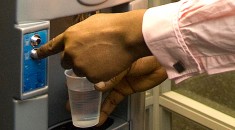Facility time, call centre working and safety in the water industry dominated UNISON’s water, environment and transport conference in Liverpool today.
Delegates also heard directly from Peter Kenway, the author of UNISON-sponsored research into ownership in the water industry.
Speakers warned of the impact that proposed civil service style restrictions on facility time would have on union activity in the Environment Agency.
Jackie Hamer, from the Environment Agency, said activities like internal UNISON meetings, including attending conference, would be affected.
“Under the guidelines, they are also looking to us to record in detail the amount of time we are spending on union activities.”
If UNISON was restricted in its use of employers; email to communicate with members, it would be a “disaster”, she added.
“If these guidelines are implemented in full it will be the biggest direct attack on our ability to represent our members and negotiate since the threat to withdraw (union subs) check-off.”
Delegates called for the executive to reinforce the message that management and trade unions in the Environment Agency found existing arrangements productive and mount a full campaign to oppose reductions in facility time.
Conference also called on the union to promote its the call centre charter in the face of “Orwellian” conditions.
Caroline Smith, of the national women’s committee, said workers in call centres are being monitored all the time and feel that “Big brother is watching you”.
She said an average of 60% of staff leave call centres every two years – and the solution is to stop treating workers like battery hen,
“A toilet break is a human right,” she said, “and a worker may be having a heavy period, or a bladder infection, irritable bowel syndrome or prostate problems.”
Lisa Harrison, from Yorkshire and Humberside, said she had coeliac disease and needed her toilet breaks, adding: “I have a colleague who dare not drink anything.”
Delegates were told of systems such as Totalview Telephony, which promises a total overview of what employees are doing and where they are.
Conference backed a range of motions aimed at protecting health and safety, mainly in the water industry.
Speakers. concerns included poor signage, manhole covers, lone working, personal protective equipment, dig team safety and the release of hydrogen sulphide.
“Direct site working” had led to a misinterpretation of the working time directive.
Cliff Greenwood from United Utilities said that to some employers, direct site working meant employees driving to their first job, checking the vehicle and logging in – all in their own time.
“This has to be resisted,” he declared.
Employers are benefitting from direct site working because they did not need a depot, a canteen, a safe area or a security guard.
Conference was warned that disappearing bus services were hitting members in public transport.
Delegates called for an active campaign on bus cuts and for branches and regions to lobby councillors and MPs.
Peter Kenway author of Who owns water?, published by UNISON, did a special presentation to delegates.
He said water was an “odd industry” where companies like Thames made high profits yet needed government support to make investment.





